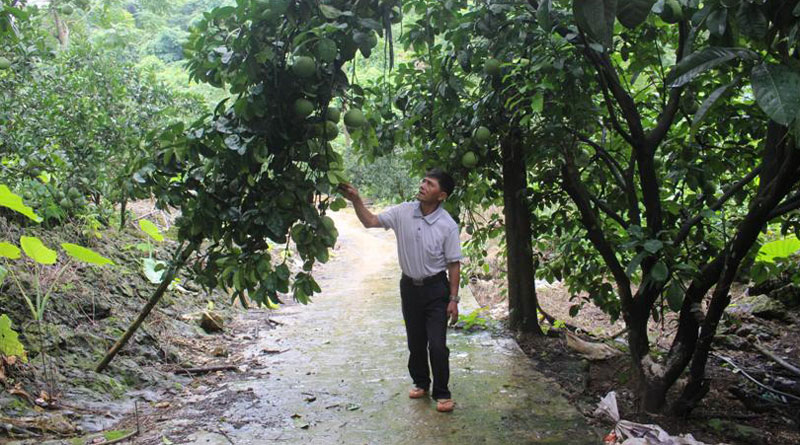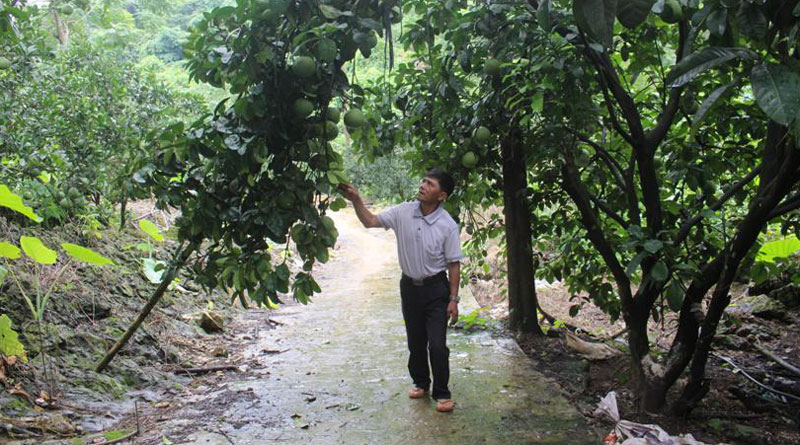
(HBO) – Responding to the appeal of the Party, Nguyen Van Chien from Dan Phuong district, former Ha Tay province, and other 100 local young people moved to work in the Hoa Binh lake area in Voi hamlet, Thai Thinh commune, the northern province of Hoa Binh, in 1978. Three years later, he decided to make a living from scratch in the locality. After 40 years, he built a big stilt house surrounded by 10-ha pomelo orchard which earns him hundreds of millions of Vietnam dong a year. However, Chien’s biggest asset is his strong will and great endeavours to surmount any difficulties he met.

Nguyen Van Chien, Voi hamlet, Thai Thinh commune, Hoa Binh
city, stands in his pomelo orchard.
Though coming from the
majority Kinh ethnic group, Chien built a stilt house of the Muong ethnic
minority group. When I entered his house, Chien’s family just came back from a
visit to their garden where they dug bamboo shoots for sale. Chien said he
planted the bamboo trees since the early years when he came here with the
support of the State. He pockets tens of millions of
Vietnam dong annually from bamboo
shoots. Four members of his family harvested 2 million tonnes of bamboo shoots
from 6-10am today, earning more than 1 million VND.
After returning from
military service, Chien and his wife decided to settle in Voi hamlet. Then, the
road linking Hoa Binh city and Voi hamlet was a trail running along hills to
the lake. On the very first days, they built a tent by wood and bamboo, and
planted corn, cassava and bean. They worked all days and came home late at
night. The cultivation of corn and cassava required great efforts but it was
even harder to sell the products. He had to get up at 3m to carry about 7km of
corn and cassava to Hoa Binh town to sell. After coming back from the market,
he continued with the farming work. If there was no corn and cassava, Chien
collected firewood to bring to the market to trade for rice and food.
After failures in planting
apricot and plum, Chien decided to bring pomelo trees from his hometown to Voi
hamlet. It was said that the severe weather conditions and mountainous soil in
the locality could not support the growth of pomelo trees. After three years,
the pomelo trees bore good-quality fruits, which motivated him to expand the
cultivation.
Taking me to the
closely-fruited pomelo orchard, Chien said Dien pomelo trees require less care
and bear tasty fruits. Traders commented that my pomelo fruits are better than
those planted in other areas. Chien said he now owns nearly
10 ha of pomelo trees. Last
year, the orchard gave a yield of more than 20,000 pomelo fruits. Apart from
the fruit, Chien also planted persimmon, guava and custard apple. Last year, he
constructed a concrete road leading to the garden.
Chien’s son, Nguyen Van
Huu, told me before saying goodbye that strong will and diligence is the asset
they have inherited from his parents./.
Viet Lam
According to data from the Hoa Binh Provincial Party Committee, the industrial production index for the first six months of 2025 is estimated to have increased by 20% compared to the same period last year. This marks the highest year-on-year growth rate for this period since 2020.
In the first six months of 2025, Hoa Binh province’s export turnover was estimated at 1.145 billion USD, marking an 18.11% increase compared to the same period in 2024. Import turnover was estimated at $ 804 million, a 17.15% increase, which helped the province maintain a positive trade balance.
The lives of the ethnic minority farmers in Tan Lac district have gradually improved thanks to the new directions in agricultural production. This is a testament to the collective strength fostered through the professional associations and groups implemented by various levels of the district’s Farmers’ Union.
With the motto the "product quality comes first,” after nearly one year of establishment and operation, Muong village’s Clean Food Agricultural and Commercial Cooperative, located in Cau Hamlet, Hung Son Commune (Kim Boi district), has launched reputable, high-quality agricultural products to the market that are well-received by consumers. The products such as Muong village’s pork sausage, salt-cured chicken, and salt-cured pork hocks have gradually carved out a place in the market and they are on the path to obtaining the OCOP certification.
In the past, the phrase "bumper harvest, rock-bottom prices" was a familiar refrain for Vietnamese farmers engaged in fragmented, small-scale agriculture. But today, a new spirit is emerging across rural areas of Hoa Binh province - one of collaboration, organisation, and collective economic models that provide a stable foundation for production.
Maintaining growing area codes and packing facility codes in accordance with regulations is a mandatory requirement for agricultural products to be eligible for export. Recently, the Department of Agriculture and Environment of Hoa Binh province has intensified technical supervision of designated farming areas and packing facilities to safeguard the "green passport" that enables its products to access international markets.



